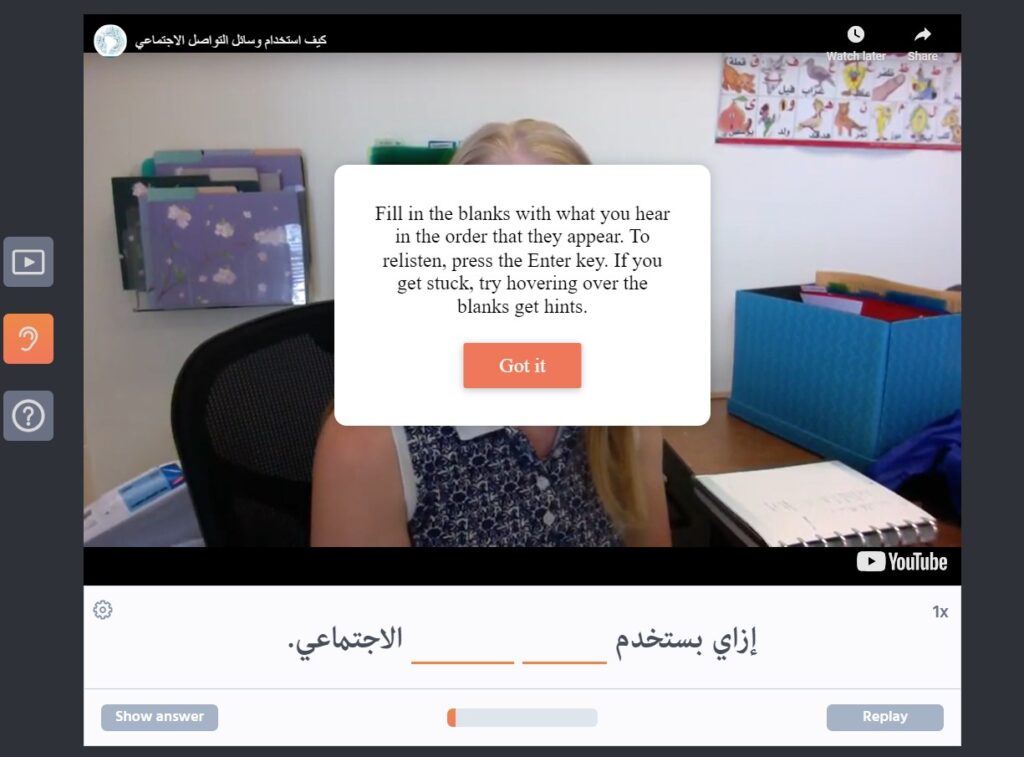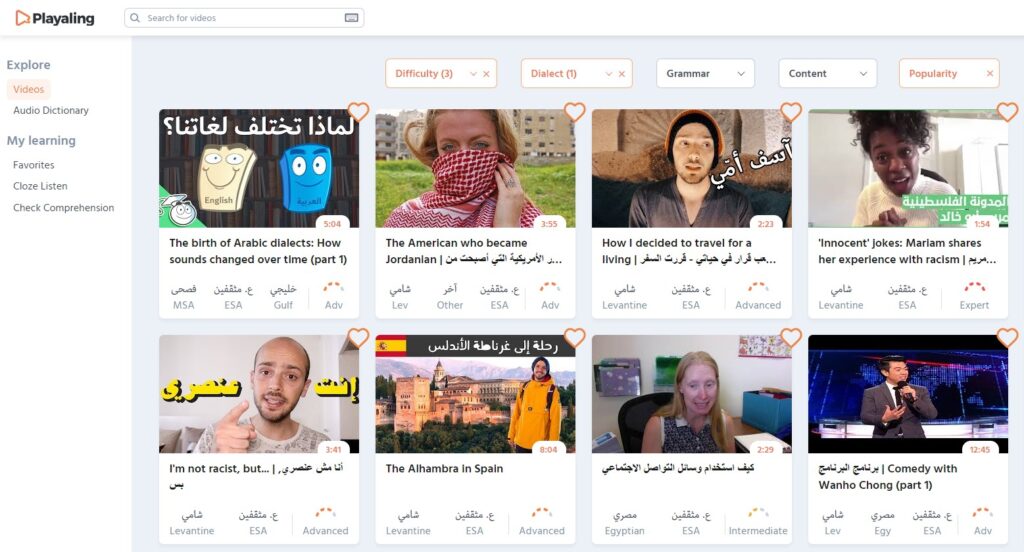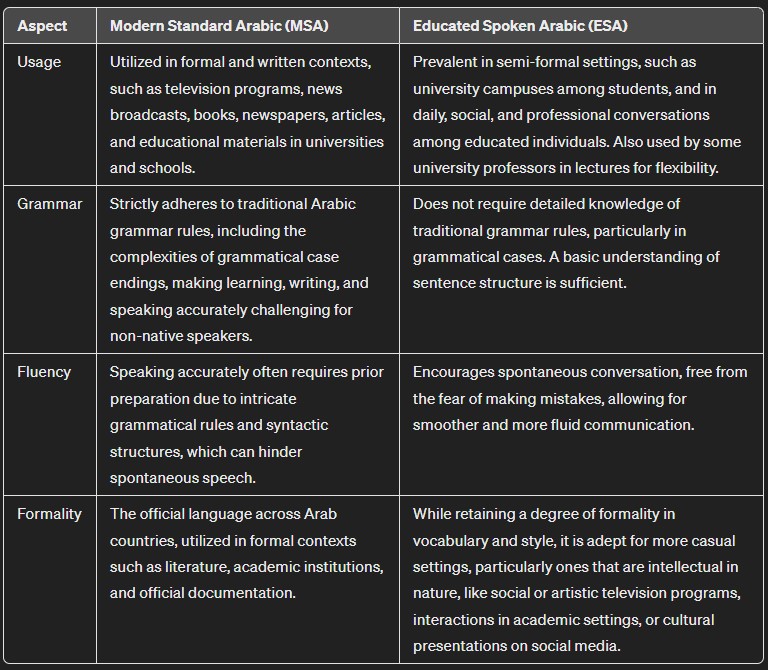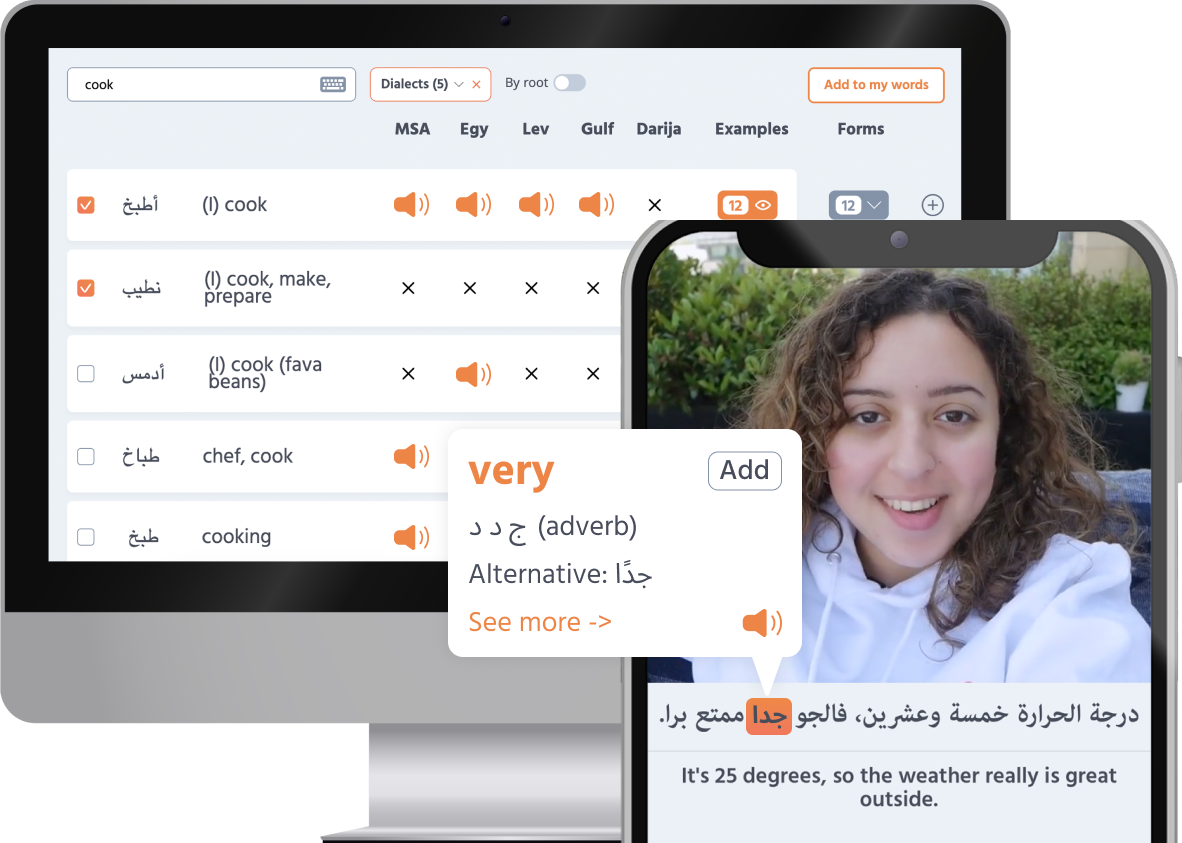Educated Spoken Arabic
Use Playaling to learn ESA, and get prepared to speak fluently in both casual conversations and formal business meetings!
Are you eager to master Educated Spoken Arabic and explore its nuances? Welcome to Playaling, your ultimate destination for learning Educated Spoken Arabic (ESA) with proficiency. Start your journey now!
Formal Spoken Arabic (FSA), or Educated Spoken Arabic (ESA), combines the Modern Standard Arabic and local Arabic dialects. Its primary aim is to facilitate the learning process of Arabic as a foreign language, as it combines the ease of colloquial dialects’ grammar and sentence structure with the vocabulary of Modern Standard Arabic.
Additionally, Arabic speakers use ESA when they want to speak in a more formal colloquial dialect, which everyone can understand. This happens, for example, when talking to their professors or when posting videos discussing scientific, technical, or other topics on social media platforms or interacting with other students. They use contemporary Arabic terms as needed while omitting case endings (grammatical markings at the end of words) and incorporating colloquial words understood by all Arabic speakers.

What is Educated Spoken Arabic?
Educated Spoken Arabic (ESA) stands apart from both Modern Standard Arabic (MSA) and colloquial dialects. It is a form of Arabic that merges elements of MSA with spoken Arabic more generally, positioning itself as a bridge between these two linguistic forms. As its name suggests in Arabic, ESA is typically spoken by individuals with a formal education—from schools or universities—or by individuals influenced by social, cultural, or professional institutions.
ESA incorporates linguistic elements common across the dialects, enabling speakers to use it for daily interactions. It represents a fusion of formal and informal language that educated Arabs across different dialects employ in casual communication.
Educated Spoken Arabic strikes a balance between formal and colloquial tone, occupying a unique space, and blending characteristics of both in terms of vocabulary and sentence structure.
How to learn Educated Spoken Arabic (ESA)?
There is no standardized curriculum for teaching and learning Educated Spoken Arabic. However, you can learn ESA by following these steps:
- Grasp the fundamentals of Modern Standard Arabic, focusing on sentence structure and essential vocabulary relevant to your topics of interest.
- Integrate common colloquial expressions shared across all dialects to ensure comprehensibility to speakers of any Arabic dialect.
- Filter for videos with Educated Spoken Arabic on Playaling and engage with real-world videos that feature this variety of Arabic. Do the Check Comprehension and Cloze Listen activities; they will help you familiarize yourself with both colloquial and formal expressions. This approach enhances your ability to communicate effectively in this variety of Arabic.
Here are some useful videos to develop your skills in Educated Spoken Arabic:
- Manners on social media | تعرف على آداب استخدام مواقع التواصل الاجتماعي
- Weather report: February 3rd, 2021
- Ibn Battuta | معلومات في 90 ثانية – إبن بطوطة
- The Moroccan wedding show – family of the bride
- Are the Arab countries “nation states”? | هل الدول العربية دول قومية
- Social distancing during the corona pandemic (part 1) | الحجز المنزلي
The golden advice to learning ESA is to listen carefully and repeat. Engage with ESA, talk and repeat what you hear, and be aware of each word’s meaning, usage, and origin. Following these steps will help you learn Educated Spoken Arabic, and learn it fast.
Finally, to learn ESA and follow the previous steps, subscribe to Playaling, the top choice for learning Educated Spoken Arabic!

Why is Playaling the best platform to learn Educated Spoken Arabic online?
Educated Spoken Arabic, since it is primarily a spoken rather than a written language, it is less formal and complex than Modern Standard Arabic. Consequently, mastering ESA requires a greater emphasis on listening and speaking skills, rather than on reading and writing. In this context, the resources provided by Playaling represent the ideal method for learning Educated Spoken Arabic. By tuning your ear to this spoken form, you’ll gain a better understanding of it and become familiar with common words used across all dialects. Additionally, you’ll acquire professional, scientific, and other specialized terms that are typically expressed in Modern Standard Arabic with confidence.
The good news is that Educated Spoken Arabic simplifies the complex grammatical rules associated with Modern Standard Arabic. This simplification allows ESA learners to pronounce words and terms from Modern Standard Arabic without the need to master their inflectional endings.
Therefore, the best method to learn Educated Spoken Arabic involves engaging with real-world examples of people communicating in this manner. This method focuses on understanding the words used, their pronunciations, and meanings, and discerning whether they are derived from a specific dialect or Modern Standard Arabic.
This is precisely what Playaling offers through the vast collection of real-world videos. Enhanced by comprehension exercises, a pop-up dictionary, and the Cloze Listen feature, our platform makes the ESA learning process not only effective but also engaging. You will be equipped to speak like educated Arabs in no time!
Explore our selection of videos featuring Check Comprehension and Cloze Listen exercises to experience the best way to learn Educated Spoken Arabic:
- My name is Abdullah | اسمي عبدالله
- Racism in Jordan (part 2)
- Racism in Jordan (part 1)
- Light pollution | التلوث الضوئي
- Nasser’s speech (part 1): ‘Exploiting religion’ (التجارة بالدين)
- Downtown Amman | وسط البلد
- Oliver’s story (part 1): Becoming Omani
- Should you have children? | الإنجاب، بين ميزان الشرع وميزان الواقع

Why is it important to learn Educated Spoken Arabic ?
Teaching Arabic to non-native speakers faces a significant challenge due to the existence of two fundamental forms of Arabic: Fusha Arabic, which includes Classical Arabic (Quranic Arabic) and Modern Standard Arabic, as well as the spoken Arabic dialects.
Fusha Arabic is the official language of Arab countries, used in schools, universities, official documents, conferences, newspapers, books, business conversations, and news broadcasts. Meanwhile, colloquial dialects are the language used and circulated in daily life among people, in the streets, at home, in the market, and on social media.
Therefore, learners of Fusha Arabic might find it challenging to use it in informal daily conversations, as it is predominantly used in formal communication, speeches, and literature. Conversely, mastering a local dialect enables communication with people from a specific region, yet it might limit interactions with speakers from other Arab regions due to dialectical differences.
Moreover, local dialects are not suitable for formal contexts, engaging with Arabic religious texts, following television programs or news broadcasts, or discussing scientific, technological, social, political, economic, and cultural concepts typically found in written materials.
Hence, the need emerged to make a linguistic compromise that would help mix the flexibility of local dialects with the elegance and structure of Fusha Arabic, which directly led to the development of Educated Spoken Arabic.
At Playaling, we offer a wide array of real-world videos for learning Educated Spoken Arabic. These are complemented by numerous features designed to facilitate the understanding of words and how to effectively communicate in this form of Arabic.

Benefits of learning Educated Spoken Arabic
Practicality
Learning Educated Spoken Arabic enables you to comprehend spoken dialects across various regions, as ESA incorporates many common words from most local dialects without being confined to any specific one.
Building confidence for learners
Beginning with learning Modern Standard Arabic and trying to converse with Arabs might be surprising, as MSA is not commonly used in everyday conversations. On the other hand, learning Educated Spoken Arabic will boost your confidence, empowering you to use this language in casual interactions beyond the formal contexts reserved for MSA.
Understanding Modern Standard Arabic
While mastering a specific Arabic dialect may pose challenges in understanding MSA, Educated Spoken Arabic serves as a bridge, enhancing comprehension of Modern Standard Arabic. This approach facilitates a broader grasp of the language’s formal aspects.
Understanding multiple varieties and dialects of Arabic
Learning Educated Spoken Arabic allows students to grasp the fundamental structure of the language, including the construction of nominal and verbal sentences, adjective agreement, and subject-verb agreement, among other aspects. Since Educated Spoken Arabic incorporates the most common features of both spoken and written Arabic, including overlapping vocabulary, mastering this form of Arabic allows for greater facility in the language across the board.

Educated Spoken Arabic vs. Modern Standard Arabic
Usage
- Modern Standard Arabic is utilized in formal and written contexts, such as television programs, news broadcasts, books, newspapers, articles, and educational materials in universities and schools.
- Educated Spoken Arabic, on the other hand, is prevalent in semi-formal settings, such as university campuses among students, and in daily, social, and professional conversations among educated individuals. It has also been embraced by some university professors in their lectures to introduce a level of flexibility to their presentations.
Grammar
- Modern Standard Arabic strictly adheres to traditional Arabic grammar rules, including the complexities of grammatical case endings. These complexities can make learning, writing, and speaking the language accurately challenging for non-native speakers.
- Educated Spoken Arabic does not require detailed knowledge of these rules, particularly in grammatical cases. A basic understanding of sentence structure in Arabic is sufficient.
Fluency
- Speaking Modern Standard Arabic accurately often requires prior preparation, due to its intricate grammatical rules and syntactic structures. This complexity can hinder spontaneous speech.
- In contrast, Educated Spoken Arabic encourages spontaneous conversation, free from the fear of making mistakes. This approach allows for smoother and more fluid communication.
Formality
- Modern Standard Arabic is the official language across Arab countries, utilized in formal contexts such as literature, academic institutions, and official documentation.
- Educated Spoken Arabic, while retaining a degree of formality in its vocabulary and style, is adept for more casual settings, particularly ones that are intellectual in nature. This includes social or artistic television programs, interactions between university professors and their students, or cultural presentations on social media.

Discover the beauty and simplicity of learning Educated Spoken Arabic with Playaling. Our platform offers a unique opportunity to delve into the Arabic language in an engaging and accessible manner, empowering you to understand Arabic speakers from diverse walks of life.
Join Playaling today to begin your adventure in Arabic learning. Subscribe for exclusive access to captivating content and enriching exercises, and integrate Arabic into your repertoire of linguistic and cultural competencies.
Table of Contents
Links
Links




